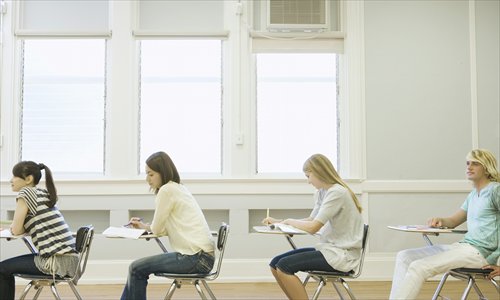Model students
What is the secret to academic success?

Emilija Antanaviciute with her bounty of awards. Photo: Li Hao/GT
"I do spend a lot of time working, including weekends and after school," said 18-year-old Emilija Antanaviciute, now in the final year of her studies at the Canadian International School of Beijing (CISB) in Chaoyang district.
Originally from Lithuania, Antanaviciute was last year presented by the school with awards for academic excellence across three of her subjects.
"The awards aren't necessarily given to the student who has the best academic results, but to the student who gives the best effort, has a well-rounded body of knowledge, and is the most engaged," said Antanaviciute.
Nevertheless, Antanaviciute's academic record in the first year of her two-year IB (International Baccalaureate) Diploma Program, an internationally recognized qualification for entry into tertiary education, was impeccable. In all six of the subjects she took as part of the diploma, covering the standard curriculum of languages and literature, sciences, mathematics and the arts, Antanaviciute achieved grades of over 90 percent.
What can the academic success of Antanaviciute and other high achievers be attributed to? How do they manage to be so well-rounded? Are those who do well at school just naturally brighter than their peers? Do they simply work harder? Is it a combination of both, or are there also social, cultural and economic factors at play?
Hard work pays off
Given Antanaviciute's stellar results across the board, many might be tempted to chalk it up to her simply being naturally gifted. Antanaviciute herself, however, attributes her success at school to hard graft.
"I'm self-motivated to work really hard. I feel like I can always go further and achieve more from myself," she said.
Antanaviciute added that although part of the reason she wanted to do well at school was for her parents, neither of them put any direct pressure on her.
"I really have a good relationship with my parents. I feel comfortable and confident at home," said Antanaviciute.
She said that her parents always supported her in endeavors, and rather than forcing her to sit down with her homework every evening, they simply reminded her in order to achieve the things she wanted, it was important for her to work hard.
Antanaviciute also insisted that her dedication to her studies did not mean that she neglected her other interests. In addition to participating in extracurricular activities like debating, Antanaviciute said that her studies did not prevent her from socializing with friends.

Saida Mirzalimova, a student at the Canadian International School of Beijing who achieved grades of higher than 90 percent across all of her subjects in the IB Diploma courses last year. Photo: Li Hao/GT
Extracurricular activities
Saida Mirzalimova, from Kazakhstan, is another CISB student who last year achieved grades above 90 percent across all of her subjects in the IB Diploma.
Like Antanaviciute, Mirzalimova credits her academic success to hard work, saying that in addition to going to the library every day after her classes finish, she spends at least four hours every evening on schoolwork.
Perhaps even more impressively however, is how Mirzalimova still manages to find time for a number of extracurricular activities. Besides boxing and debating, Mirzalimova has founded her own charity organization with a friend, and spends many of her weekends visiting hospitals, orphanages and animal shelters.
Asked about whether there was any link between her extracurricular activities and her academic success, Mirzalimova said the importance of engaging in activities other than studying was that it allowed her to unwind and take a temporary respite from the pressures of school.
"The charity work makes me think about how the world is so much bigger [than just studying]," said Mirzalimova.
Another student who has managed to balance her academic achievements with extracurricular interests is 16-year-old Vivian Zhang, who is also in the final year of her IB Diploma at the International School of Beijing in Shunyi district.
"I'm not a bookworm, but I love studying," said Zhang.
Although her results last year placed her in the top three academically for her grade, Zhang said that she was more proud of the fact that she had founded her own graphic design company along with one of her classmates.
"I think the positive impact of my extracurricular activities to my academic results is enormous," said Zhang. "[For example], at its heart, design is about visual problem solving, which is valuable to any discipline."
Zhang is also a passionate debater, and was part of a team that finished 8th at a Stanford University invitational tournament in February this year.
Summing up the importance of extracurricular endeavors to academic success, Antanaviciute said that it boiled down to cultivating a passion for learning.
"I think they contribute to me being a more well-rounded and open-minded person, which helps in seeing the bigger picture when learning my subjects," said Antanaviciute. "They make me a better learner, who is more adapted to receiving various kinds of information."

Both teachers and high-achieving students agree that although hard work is important, academic success is not only about hitting the books. Photo: IC
Nature versus nurture
It has been well-documented in recent years students who are of Asian ethnicity tend to do better academically at school.
This trend can be observed both when comparing Asian students to non-Asian students studying in the same country, and in studies that have compared the academic proficiency of students from Asian countries to those in other countries.
In a report released by OECD (Organisation for Economic Co-operation and Development) in 2013 comparing educational proficiency across more than 70 countries, middle school students from China were shown to regularly outperform their British and US peers in mathematics, science and literacy.
Few these days would argue that Asian students' superior academic ability is due to genetic predisposition. But could looking at the reasons that have been suggested for Asian students' academic success help to reveal the factors that are important to academic achievement in general?
A paper contributed to the US-based National Academy of Sciences in April this year by sociologists Amy Hsin and Yu Xie suggested that the primary reason for Asian students' academic success in the US was in general that they tried harder than their peers. As for why it was that Asian students tried harder than their peers in their studies, Hsin and Yu identified one of the main factors as cultural upbringing.
This explanation is borne out by the three students Metropolitan spoke to. Not only did all three students credit their own success to hard work, but all three said that the reason they were inclined to work hard was due, in various ways, to the influence of their parents.
"I don't think bringing back home bad results is an option," said Zhang, whose family is originally from Sichuan Province. "My parents used to have a similar attitude to most Asian parents, mainly focusing on test results."
Mirzalimova gave a similar explanation.
"Asian kids are more disciplined compared to other kids," she said, adding that her father, who is part-Chinese, was more strict when it came to her studies than her mother, who is Russian. Regardless of the ethnic background of her family, Mirzalimova said that the motivation for her to do well in her studies was to make her parents proud.
"What my parents value the most is my desire to learn something new," she said.
Antanaviciute, too, said that her parents were one of the main reasons for her success.
"I don't want to disappoint myself and my family," she said. "I think it can be a cultural thing, but it really isn't bound by your age, race or gender."
Both Antanaviciute and Mirzalimova said that rather than being determined by ethnicity, the highest achievers among their peers were those who were self-driven and had a clear sense of their own goals.
Rejecting stereotypes
Tarek Razik, the head of the International School of Beijing, rejected the stereotype of Asian students being academically successful but socially awkward.
"It's a broad generalization to say that. We have a lot of Asian students here, who do well academically, socially and athletically," he said.
Razik, who has held teaching and administrative positions in Jamaica, Puerto Rico, Germany, Japan, Thailand and the US, said that based on his experience, all high-achieving students shared the same desire to succeed.
"They have a good sense of who they are, their strengths and weaknesses as learners, as well as being very motivated and committed to trying to improve themselves," said Razik. "The motivation comes from within the students."
However, Razik also insisted that academic achievement was not the be-all and end-all, saying that it was important that students were able to balance their studies with their other interests.
"We don't want only smart kids," said Razik. "We want kids who are well-rounded."